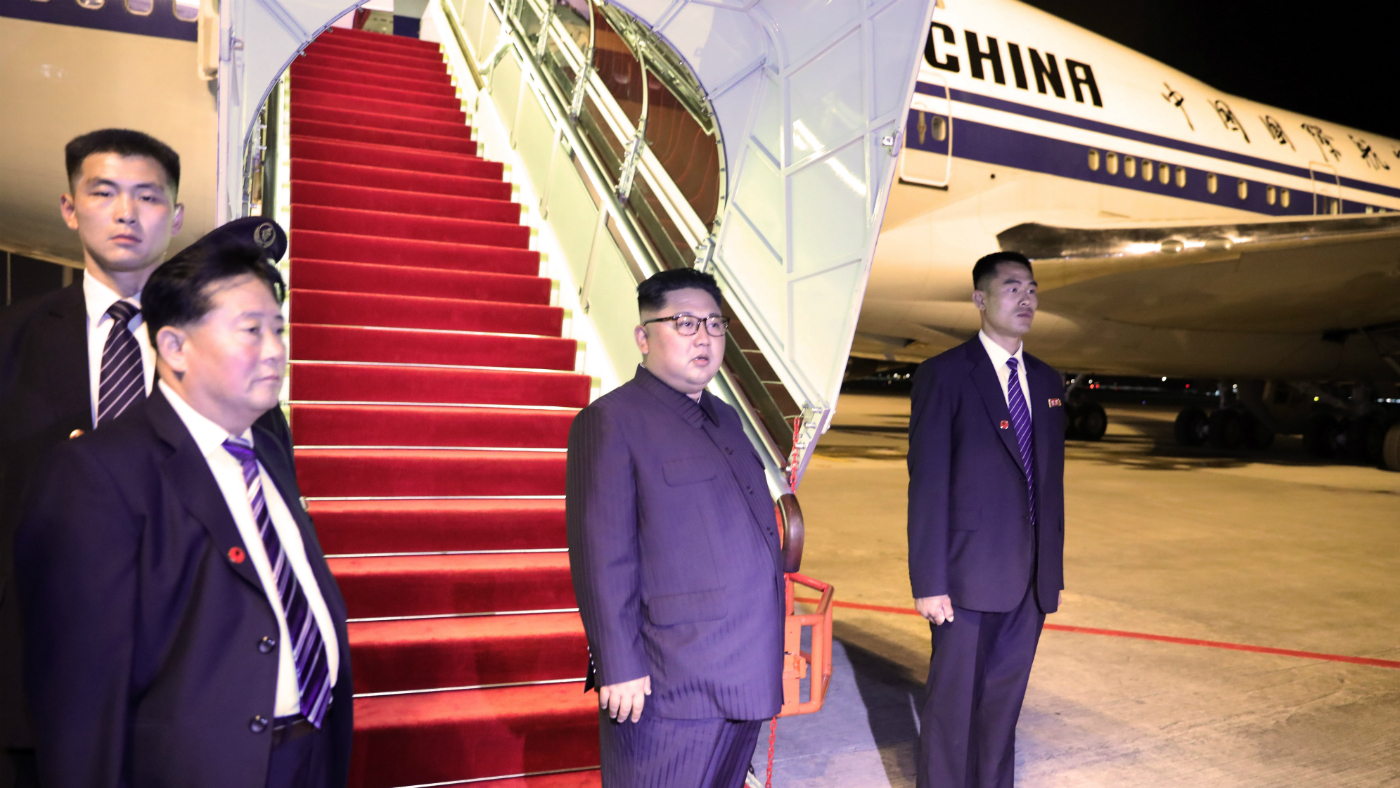What is Kim Jong Un doing in China?
North Korean leader is visiting neighbouring Asian country for third time this year

A free daily email with the biggest news stories of the day – and the best features from TheWeek.com
You are now subscribed
Your newsletter sign-up was successful
North Korean leader Kim Jong Un has landed in Beijing for a two-day state visit to China, Chinese state media have announced.
It is Kim’s third trip to China this year, and comes a week after he met President Donald Trump in Singapore for a historic summit between North Korea and the US.
In Singapore, Kim agreed to work with Trump toward complete denuclearisation of the Korean Peninsula. Much to the surprise of US allies in Asia, Trump in turn pledged to end joint military exercises with South Korea, which he described as “war games”.
The Week
Escape your echo chamber. Get the facts behind the news, plus analysis from multiple perspectives.

Sign up for The Week's Free Newsletters
From our morning news briefing to a weekly Good News Newsletter, get the best of The Week delivered directly to your inbox.
From our morning news briefing to a weekly Good News Newsletter, get the best of The Week delivered directly to your inbox.
Chinese state media announced Kim’s latest visit ahead of his arrival - a marked contrast to the official handling of his previous visits, which were only confirmed after he had left the country, says US news network CNBC. No other details were provided.
What is Kim doing in China?
“China is North Korea’s most important diplomatic and economic backer but has been angered by Pyongyang’s nuclear and missile tests,” CNBC reports.
Kim’s visit may be one way for China to “highlight its crucial role” in US efforts to get North Korea to abandon its nuclear programme, says ABC News. Chinese President Xi Jinping “is exerting a lot of influence from behind the scenes”, according to Bonnie Glaser, senior adviser for Asia at the Washington DC-based Center for Strategic and International Studies.
A free daily email with the biggest news stories of the day – and the best features from TheWeek.com
The trip has come at an intriguing time, however. The US usually looks to China to bring North Korea to the negotiating table, but while US-North Korean relationships appear to be on the mend, ties between Beijing and Washington are being strained by a major trade dispute.
Chinese Foreign Ministry spokesperson Geng Shuang said that the visit would “strengthen our strategic communication on major issues to promote regional peace and stability”.
Geng added that Beijing supports Russia’s calls last week for the immediate cancellation of unilateral sanctions on North Korea - sanctions not imposed by the United Nations framework.
“China always stands against the so-called unilateral sanctions outside the Security Council framework. This position is very clear and we believe sanctions themselves are not the end,” he said.
What else has China said?
Cheng Xiaohe, an associate professor at Renmin University’s School of International Studies in Beijing, said the visit - combined with the fact that Chinese state broadcaster CCTV announced Kim’s visit beforehand - “shows that China is moving toward a healthier and more normal direction in relations with North Korea”.
Yang Mu-jin, a professor at the University of North Korean Studies in Seoul, said Kim’s repeated visits to Beijing this year show that the recent chill between the two countries over Kim’s development of nuclear weapons and long-range missiles had fully lifted.
“I believe that indicates that the blood alliance between the North and China has been completely restored,” Yang said.
-
 The environmental cost of GLP-1s
The environmental cost of GLP-1sThe explainer Producing the drugs is a dirty process
-
 Greenland’s capital becomes ground zero for the country’s diplomatic straits
Greenland’s capital becomes ground zero for the country’s diplomatic straitsIN THE SPOTLIGHT A flurry of new consular activity in Nuuk shows how important Greenland has become to Europeans’ anxiety about American imperialism
-
 ‘This is something that happens all too often’
‘This is something that happens all too often’Instant Opinion Opinion, comment and editorials of the day
-
 The fall of the generals: China’s military purge
The fall of the generals: China’s military purgeIn the Spotlight Xi Jinping’s extraordinary removal of senior general proves that no-one is safe from anti-corruption drive that has investigated millions
-
 Epstein files topple law CEO, roil UK government
Epstein files topple law CEO, roil UK governmentSpeed Read Peter Mandelson, Britain’s former ambassador to the US, is caught up in the scandal
-
 Iran and US prepare to meet after skirmishes
Iran and US prepare to meet after skirmishesSpeed Read The incident comes amid heightened tensions in the Middle East
-
 Israel retrieves final hostage’s body from Gaza
Israel retrieves final hostage’s body from GazaSpeed Read The 24-year-old police officer was killed during the initial Hamas attack
-
 China’s Xi targets top general in growing purge
China’s Xi targets top general in growing purgeSpeed Read Zhang Youxia is being investigated over ‘grave violations’ of the law
-
 Panama and Canada are negotiating over a crucial copper mine
Panama and Canada are negotiating over a crucial copper mineIn the Spotlight Panama is set to make a final decision on the mine this summer
-
 Why Greenland’s natural resources are nearly impossible to mine
Why Greenland’s natural resources are nearly impossible to mineThe Explainer The country’s natural landscape makes the task extremely difficult
-
 Iran cuts internet as protests escalate
Iran cuts internet as protests escalateSpeed Reada Government buildings across the country have been set on fire